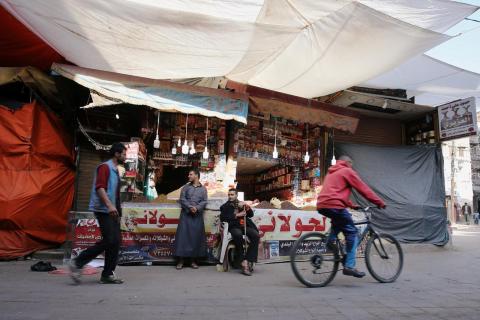Aden Declared An ‘Infested’ City As Yemen Faces COVID-19


Earlier this week, Aden, the “interim seat of the Saudi-backed government”, was declared an “infested city”, reports Reuters. The World Health Organization (WHO) stated that there is “full-blown transmission of the virus in Yemen, with the disease spreading undetected among a population with some of the lowest levels of immunity to disease compared with other states.” Currently, there have been fifty six reported cases of coronavirus and nine deaths in areas under the Saudi-backed government’s control, and the Iran-aligned Houthi movement reports two coronavirus cases and one death. However, given the minimal infrastructure and nearly nonexistent testing, it is likely that there are far more cases in Yemen than those reported.
According to Reuters, the nationwide ceasefire prompted by the coronavirus outbreak negotiated in April has been extended. Though no formal truce has been established, it seems that much of the fighting has stopped, or at least lessened, over the past few weeks. However, in a recent development, the separatist Southern Transitional Council (STC) declared self-rule. The area controlled by the STC includes Aden and other regions in the south of Yemen, which threatens to generate further conflict in what Reuters has termed a “multifaceted war”.
It is unclear when and where the first coronavirus patient died in Yemen. And the lack of public awareness of the disease, in addition to continued violence and minimal hygiene, puts the Yemeni population at high risk. Moreover, coronavirus symptoms are characteristic of other contagious diseases, like dengue fever, that are common to Yemen. It can be difficult for doctors to distinguish coronavirus from these other maladies. Finally, Yemen has porous borders, allowing migrants to enter the country at will. According to Reuters, migrants are stigmatized as “transmitters of disease” and some have been forced to move to the frontlines of the war and desert areas, putting them further at risk.
Several weeks ago, Dr. Shalal Hasel, an official from the Department of Epidemiological Surveillance in Yemen’s Lahj province, said in an interview with the BBC that the health situation is deteriorating and “hospitals [in Yemen] are limited and not equipped to receive coronavirus cases”. Corroborating Dr. Hasel’s statement, Tamuna Sabadze of the International Rescue Committee said that “the most likely scenario suggests that at least 18,000 intensive care beds will be needed”. Yemen does not have the resources to contain the coronavirus epidemic or provide satisfactory treatment, especially because the disease will exacerbate the devastation of Yemen’s five-year civil war that has led to widespread malnutrition, famine, and displacement.
As of 3 May, there were only 208 ventilators in the entire country – though 417 were in the process of being shipped. These additional ventilators will be sent to the 37 ‘isolation centres’ across Yemen which consist of repurposed health facilities and makeshift hospitals set up and staffed by the WHO. The lack of ventilators and the makeshift nature of these hospitals is concerning, particularly given the projected need for thousands of intensive care beds. However, Dr. Hasel pointed out that it is not merely the lack of ventilators and hospital space that pose a problem. Yemeni doctors also do not have access to adequate PPE or generators to run the ventilators. Additionally, reports the BBC, Yemenis live in crowded conditions and 50% of the population does not have access to running water. Yemen’s minimal infrastructure makes successfully fighting the coronavirus a near impossible task.
Aden’s new status as an “infested” city is only the beginning. Yemen, already beleaguered by the interminable civil war and resulting humanitarian disaster, does not have the resources to effectively address the coronavirus. Although Yemen does not have enough testing to track the spread of the virus, it is likely that much of the country will become quickly “infested” in the coming weeks and months.

Paris — The French humanitarian organization Acted announced that it has delivered cash assistance to nearly 89,000 people affected by displa…

Sana’a — Fuel and food imports into ports under the control of Yemen’s Houthi movement on the Red Sea have continued to fall for…

ADEN — Yemen Airways, the country’s national carrier, announced it will resume flights between Aden and Abu Dhabi beginning in January…